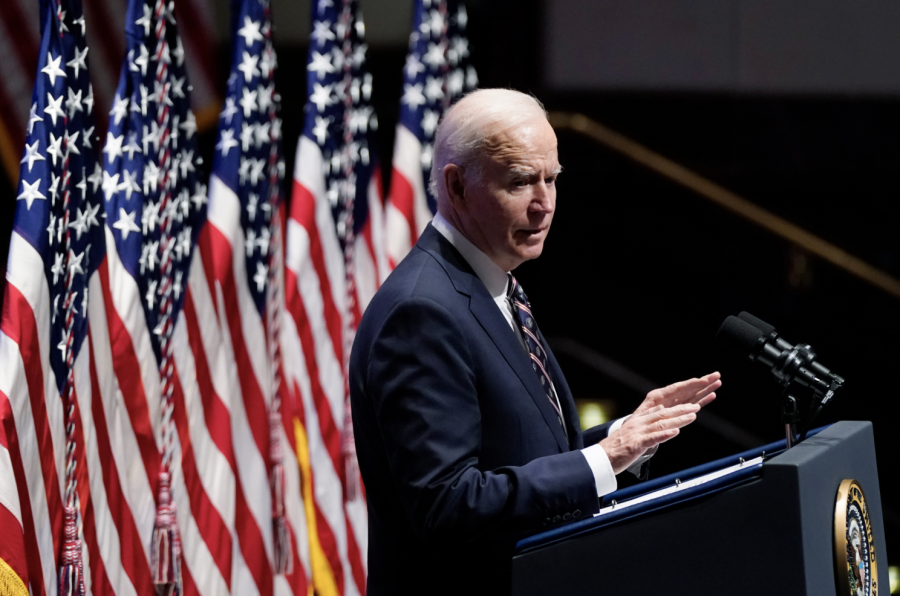A Return to Normalcy: President Biden’s First Year in Office
Jan. 6, two weeks before Inauguration Day, has become a central part of modern American history and the Joe Biden presidency. Biden’s presidency officially began on Jan. 20, 2021. However, I know that I, and many other Americans, remember Jan. 6 more clearly. The raid on the capital resulted from a boiling point of decades of American tensions stoked and preyed upon by former President Donald Trump.
Joe Biden was elected mainly because he is not Donald Trump or any other highly polarizing political figure. Within Congress, he is known for his bipartisanship and willingness to work across the aisle. Democratic and Independent voters, in a bid to deny Trump a second term, voted for who they thought would win and be able to unite a divided America.
He did not, in any sense of the term, receive an electoral mandate. He narrowly won the electoral college, had a 50-50 tie in the Senate and a dwindling majority in the House. Amid the COVID-19 pandemic, economic downturn, a divided party, political upheaval and overall confusion about the direction of our country, Biden was faced with a task: Fix it.
The one-year marker of Biden’s inauguration and Jan. 6 came and went last month. Arguably the most significant issue on the table during the 2020 Presidential Election was COVID-19. Biden’s election brought hope to a more unified message about COVID-19 precautions, testing and most of all, vaccines. Biden’s promises hinged on making vaccines widely available and imposing mandates, if necessary, to vaccinate 70% of the world’s population by September 2022, according to The Associated Press. This goal is well on its way to completion by January of this year, when 61% of the world had received at least one dose of the COVID-19 vaccine. A massive accomplishment for the administration was passing the 1.9 trillion dollar COVID-19 relief package, which provided direct aid to Americans and small businesses. But, while he has had legislative successes regarding COVID-19, there have still been two widespread variants wreaking havoc on the world’s population: Delta and omicron. These variants have exposed our continued testing shortage and the prevailing lack of support for overworked and underpaid healthcare workers.
In addition to his priority of fighting COVID-19, Biden’s choice of Kamala Harris as vice president emphasized his promise to Black voters that he would fulfill their expectations for his presidency. With the recent defeat of the newest Voting Rights Bill introduced in Congress, it looks as if voting will only become harder for Black and brown voters, according to Reuters. Democrats failed to defeat the filibuster in the Senate due to the refusal of senators Manchin and Sinema to vote for the rules change, which would bring the voting threshold from 60 to 50 votes. According to the Washington Post, in the wake of this legislative failure and a charged response from many civil rights groups around the country, Biden signed four executive actions aimed at systemic racism. These measures aim to strengthen anti-discrimination housing acts, stop federal contracts with private prisons, increase the sovereignty of Native American tribes and fight the increased racism and xenophobia faced by Asian Americans that came with the COVID-19 pandemic. Though these executive actions are a step towards progress, they come far from close to civil rights organizations’ expectations for the administration.
The pandemic left the economy in turmoil. The bounceback and growth that have occurred during the Biden Administration are some of the biggest in modern presidential history, including the addition of 6.2 million jobs, according to Business Insider and Fact Checker. The unemployment rate is down to 3.9%, an incredible 2.5 percentage point drop from when Biden took office. Of course, the return to normal(er) after the worst of the pandemic definitely contributed to this success. Still, much of it has come from the administration’s policies and actions.
The reviews of Biden’s foreign policy have been, for better or worse, focused on his withdrawal from Afghanistan. According to the United States Senate Committee on Foreign Relations, thousands of Afghan citizens were left behind in the evacuations, staining the administration’s image regarding foreign policy. However, Biden’s relations with Russia and China have notably improved. According to Foreign Policy, the administration’s boycott of the Beijing Olympics and their support for Taiwan has been praised as well as more recent pushback against Russia’s President Vladimir Putin in tandem with European allies.
Biden, inheriting decades-long battles started by presidents long before him, put healthcare and immigration on his list of priorities. But healthcare legislation has been centered around the pandemic, and the fight over vaccine mandates and Biden’s immigration policies have been met with frustration from many activists. The amount of Trump-era policies remaining is a significant reason for this criticism, according to the Migration Policy Institute. But, despite the lack of action on two key campaign promises — legalizing unauthorized immigrants and an asylum system for the U.S.-Mexico border — the administration has accomplished smaller-scale goals through executive action.
The support for Joe Biden throughout the Democratic Primary was initially lukewarm, but the base rallied in the general election once it was clear that he was the only hope to stop a second term of Donald Trump. The high expectations for drastic change that many farther to the left held were unrealistic if you look at Biden’s track record in the Senate and in the former President Barack Obama Administration. These go hand in hand with Trump supporters’ fears that Biden would destroy our country with socialism and extreme leftist policies. Neither occurred. If you look at Biden’s promises, many were achieved successfully. The vaccine rollout and economic and job growth, most notably. Above all, Biden brought back a sense of stability to our government. I know that I, and many other people, check the news far less regularly and with far less dread than I did during the previous administration, and maybe this is Biden’s most significant accomplishment of all.

Samantha Wotring is a junior from Houston, TX concentrating in English and history. She has previously served as an Assistant News Editor and staff writer...









